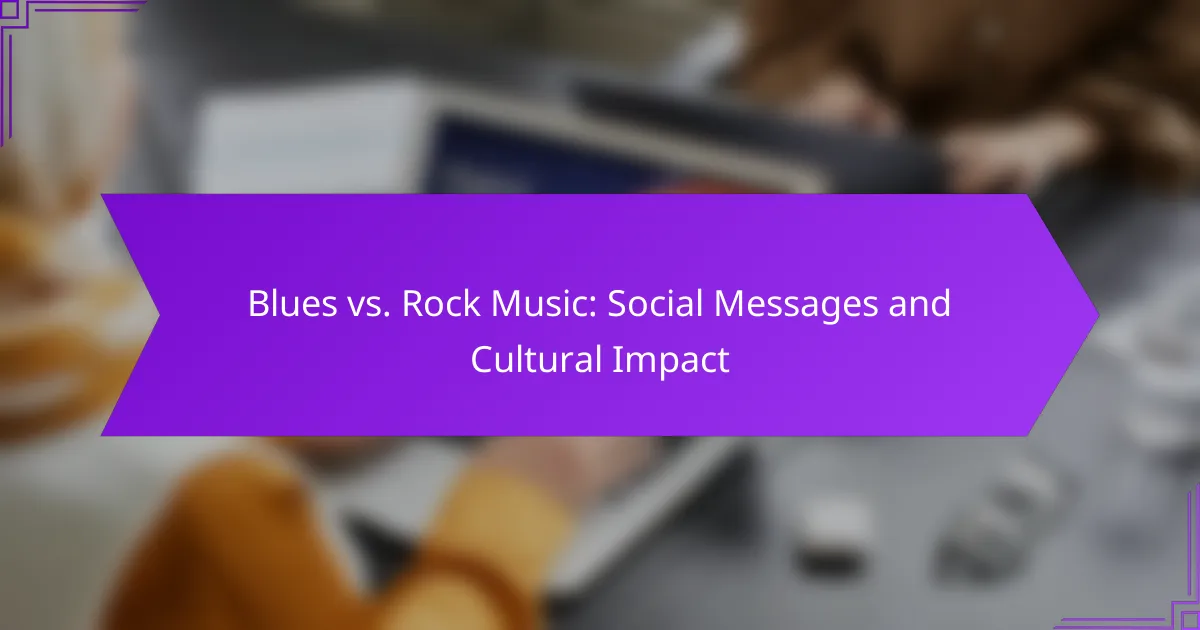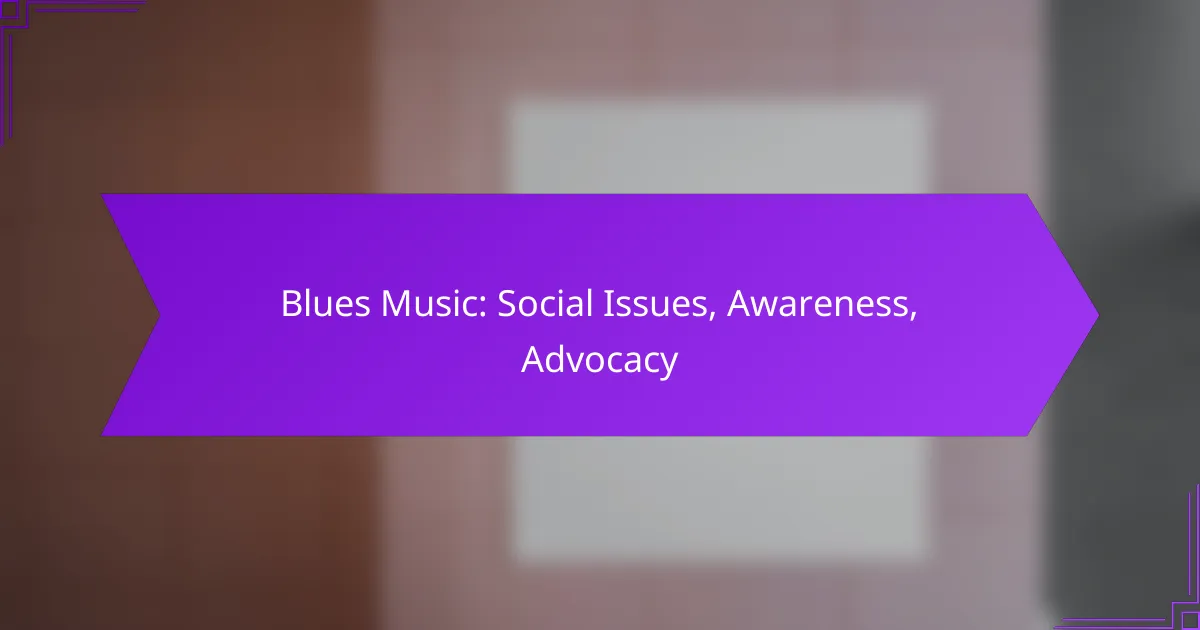Blues music serves as a powerful medium for addressing social justice issues, articulating the struggles and injustices faced by marginalized communities. Through poignant lyrics and themes, it not only expresses the pain of oppression but also fosters resilience and hope for change, making it a vital form of cultural expression and protest.
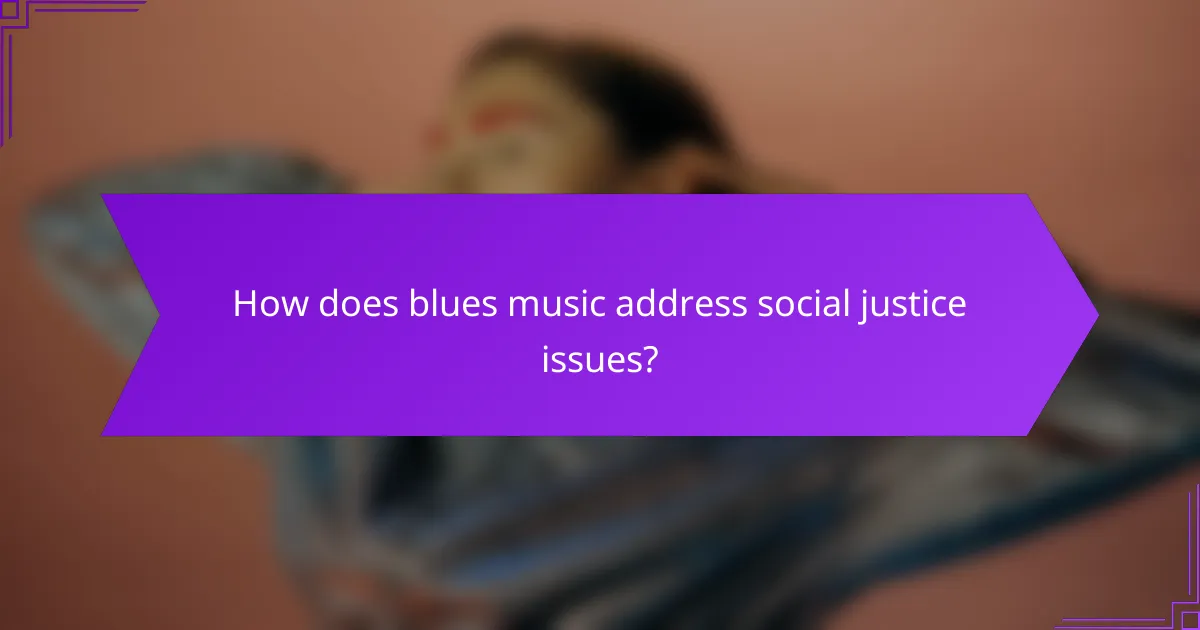
How does blues music address social justice issues?
Blues music serves as a powerful medium for addressing social justice issues by expressing the struggles and injustices faced by marginalized communities. Through its lyrics and themes, blues articulates the pain of oppression while also fostering resilience and hope for change.
Historical context of blues as protest
The blues originated in the Deep South of the United States in the late 19th and early 20th centuries, rooted in African American spirituals, work songs, and folk music. This genre emerged during a time of significant racial discrimination and economic hardship, making it a natural outlet for expressing discontent and advocating for social justice.
Many early blues songs highlighted the struggles of African Americans, addressing issues such as poverty, inequality, and systemic racism. Artists used their music to document personal and collective experiences, creating a historical narrative that resonates with ongoing social justice movements.
Key artists advocating for social change
Several influential blues artists have used their platform to advocate for social change. For instance, B.B. King and Muddy Waters incorporated themes of struggle and resilience in their music, often reflecting the harsh realities of life for African Americans. Their songs not only entertained but also educated listeners about the social injustices of their time.
More contemporary artists, like Billie Holiday and Nina Simone, have also made significant contributions to the genre by addressing civil rights issues directly in their lyrics. Holiday’s “Strange Fruit” is a poignant example, powerfully condemning racism and lynching in America.
Impact of lyrics on social movements
The lyrics of blues songs have played a crucial role in inspiring social movements by raising awareness and fostering solidarity among listeners. Songs that speak to the experiences of oppression often resonate deeply, motivating individuals to take action and advocate for change.
Moreover, the emotional weight of blues music can amplify the messages of social justice campaigns, making them more relatable and impactful. By connecting personal stories to broader social issues, blues artists have helped galvanize support for movements aimed at achieving equality and justice.
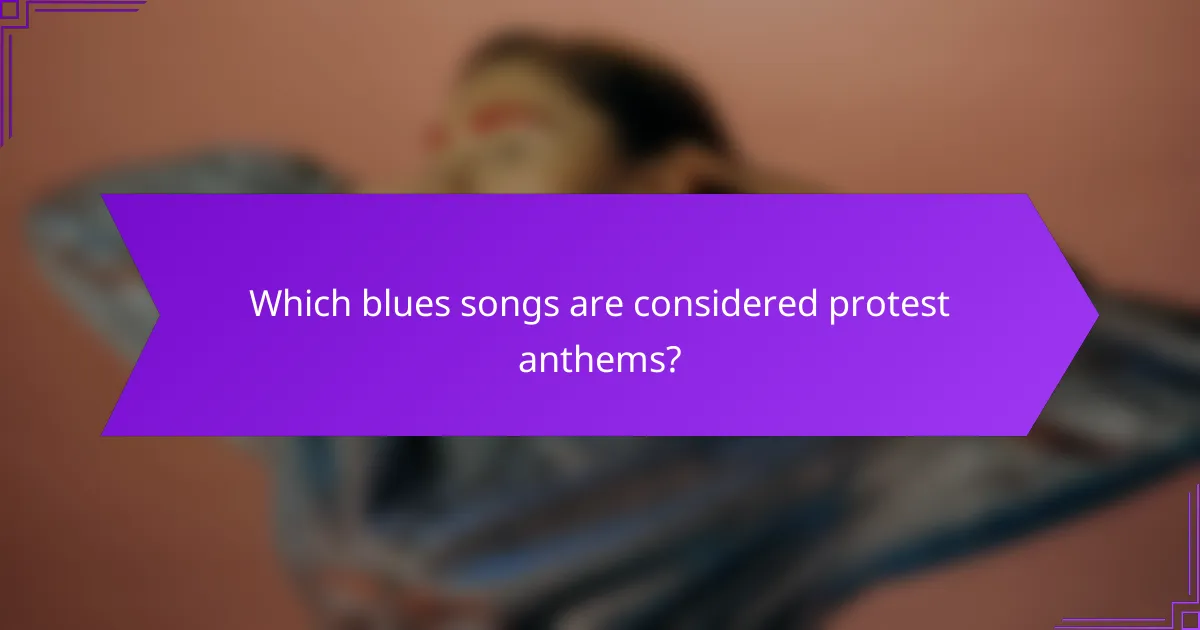
Which blues songs are considered protest anthems?
Several blues songs serve as powerful protest anthems, addressing social injustices and advocating for change. These tracks often reflect the struggles faced by marginalized communities, using music as a means of expression and resistance.
“Strange Fruit” by Billie Holiday
“Strange Fruit” is a haunting song that addresses the lynching of African Americans in the South. Released in the late 1930s, its stark imagery and emotional delivery made it a pivotal piece in the civil rights movement.
The song’s lyrics metaphorically describe the bodies hanging from trees, creating a visceral impact that confronts listeners with the brutal reality of racism. It remains a significant cultural reference for discussions on racial violence and injustice.
“The Times They Are A-Changin'” by Bob Dylan
The lyrics encourage listeners to embrace change and recognize the shifting social landscape, resonating with movements advocating for civil rights and anti-war sentiments. Its universal message continues to inspire activists today.
“Mississippi Goddam” by Nina Simone
Nina Simone’s “Mississippi Goddam” is a direct response to the racial violence and injustices faced by African Americans, particularly in the South. Written in the wake of the 1963 16th Street Baptist Church bombing, the song expresses outrage and frustration over systemic racism.
Simone’s powerful delivery and the song’s urgent tone make it a rallying cry for civil rights activists. Its candid lyrics confront the listener with the harsh realities of discrimination, making it a timeless anthem for social justice.
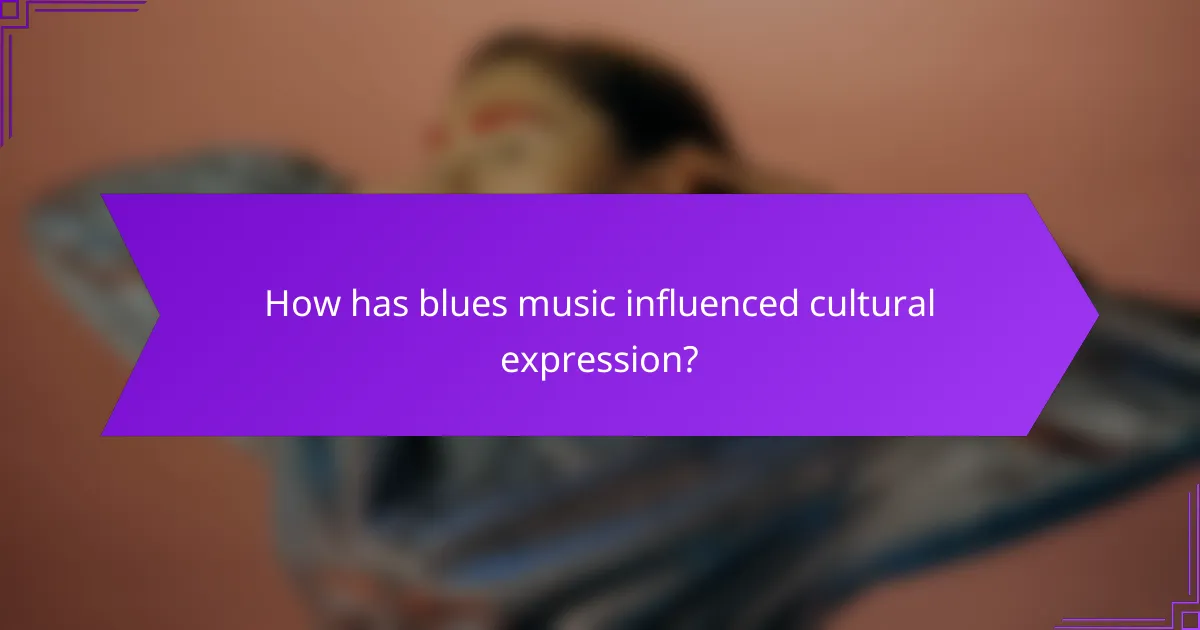
How has blues music influenced cultural expression?
Blues music has profoundly shaped cultural expression by serving as a voice for social justice and personal storytelling. It reflects the struggles and triumphs of marginalized communities, particularly African Americans, and has inspired various art forms and social movements.
Blues’ role in African American identity
The blues is a fundamental aspect of African American identity, encapsulating the historical experiences of oppression and resilience. It emerged from the African American experience in the Deep South, blending African musical traditions with European influences to create a unique sound that resonates with cultural heritage.
Through its lyrics and melodies, blues music articulates the joys and sorrows of life, fostering a sense of community and shared identity among listeners. This genre has become a powerful means of expressing the complexities of African American life, from the struggles against racism to the celebration of cultural pride.
Connection to other musical genres
Blues music has significantly influenced a variety of other musical genres, including jazz, rock, and R&B. Its characteristic elements, such as the twelve-bar structure and call-and-response patterns, have been adopted and adapted by countless artists across different styles.
This cross-pollination has led to the creation of new genres, showcasing the blues’ versatility and enduring impact on the music landscape. For instance, rock and roll emerged in part from blues traditions, with artists like Chuck Berry and Elvis Presley drawing heavily from its rhythms and themes.
Blues festivals promoting cultural heritage
Blues festivals play a crucial role in promoting cultural heritage by celebrating the genre and its roots. Events like the Chicago Blues Festival and the New Orleans Jazz & Heritage Festival not only showcase performances but also educate attendees about the history and significance of blues music.
These festivals often feature workshops, discussions, and exhibitions that highlight the contributions of blues artists to cultural expression. They serve as a platform for both established and emerging musicians, ensuring that the legacy of blues continues to thrive and evolve within the community.
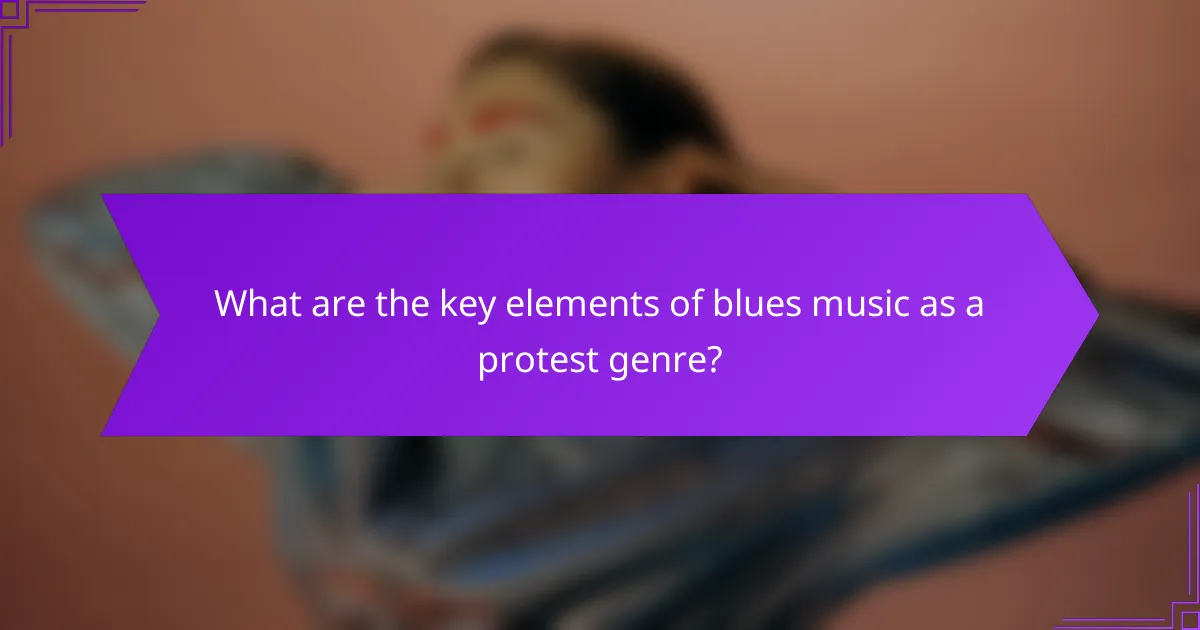
What are the key elements of blues music as a protest genre?
Blues music as a protest genre is characterized by its emotional depth, storytelling, and distinctive instrumentation. These elements combine to convey social justice themes and cultural expressions, often reflecting the struggles and resilience of marginalized communities.
Emotional expression through music
Emotional expression is central to blues music, allowing artists to convey feelings of pain, sorrow, and hope. The use of vocal techniques, such as bending notes and employing a call-and-response style, enhances the emotional impact of the songs. This raw emotionality resonates with listeners, creating a powerful connection to the themes of protest and social justice.
For example, many blues songs capture the struggles of everyday life, often addressing issues like poverty, discrimination, and injustice. This emotional authenticity invites audiences to empathize with the experiences being shared, making the music a potent form of protest.
Use of storytelling in lyrics
Storytelling is a vital component of blues music, with lyrics often narrating personal experiences or broader social issues. These narratives can highlight injustices faced by individuals or communities, serving as a form of social commentary. The storytelling aspect allows listeners to engage with the themes on a deeper level, often prompting reflection and discussion.
Blues artists frequently draw from their own lives or the lives of those around them, creating relatable and impactful stories. This approach not only preserves cultural history but also fosters a sense of solidarity among listeners who may share similar struggles.
Instrumentation and style unique to blues
The instrumentation and style of blues music contribute to its distinctive sound and emotional resonance. Common instruments include the guitar, harmonica, and piano, often played in a way that emphasizes rhythm and melody. The use of specific scales, such as the blues scale, creates a unique tonality that enhances the genre’s emotional depth.
Blues music typically features a 12-bar structure, which provides a familiar framework for both musicians and listeners. This structure, combined with improvisation, allows artists to express their individuality while addressing collective themes of protest and social justice.
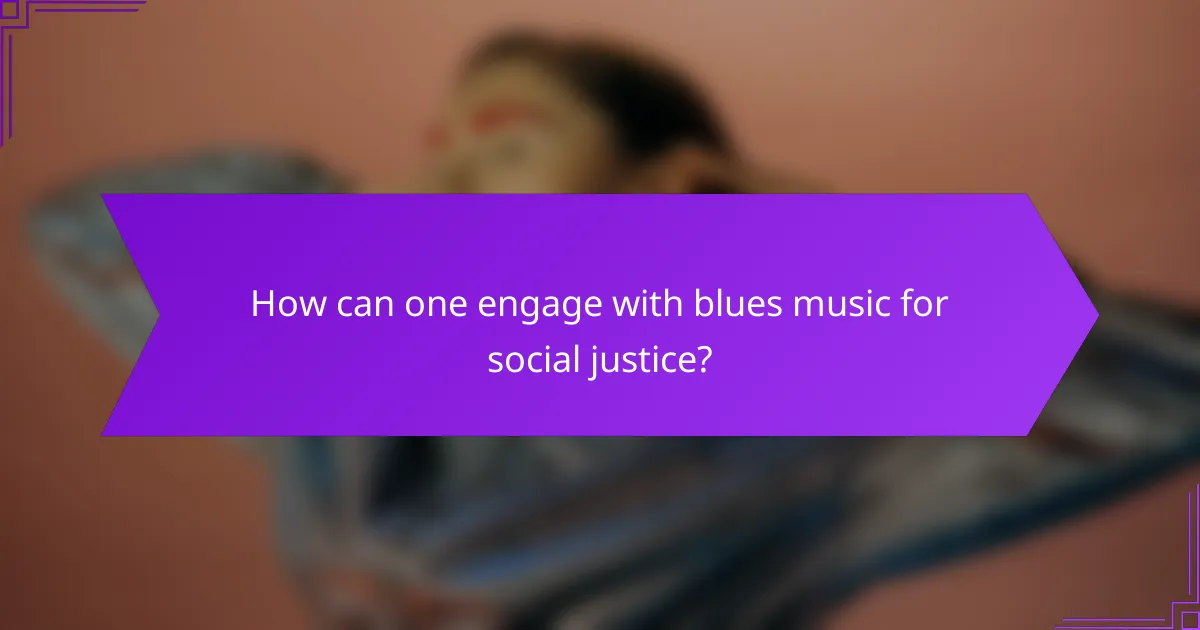
How can one engage with blues music for social justice?
Engaging with blues music for social justice involves actively participating in the culture and supporting artists who address social issues through their work. This can be done by attending events, streaming music, and joining discussions that highlight the genre’s role in advocating for change.
Attending local blues events
Attending local blues events is a direct way to support the genre and its messages. Look for concerts, festivals, or open mic nights in your area that feature blues artists, especially those who focus on social justice themes. These gatherings not only showcase talent but also foster community engagement and awareness.
Check local listings or social media for upcoming events, and consider bringing friends to amplify the experience. Participating in these events can help raise funds for social causes and provide a platform for artists to share their messages.
Supporting artists through streaming platforms
Supporting blues artists through streaming platforms is crucial for their financial sustainability and visibility. Services like Spotify, Apple Music, and Bandcamp allow listeners to access a wide range of blues music, including protest songs that address social justice issues. By streaming and sharing these tracks, you help promote the artists and their messages.
Consider creating playlists that highlight songs with social justice themes and share them with your network. Additionally, purchasing music or merchandise directly from artists’ websites can provide them with more substantial support compared to streaming alone.
Participating in community discussions
Participating in community discussions about blues music and social justice helps raise awareness and fosters a deeper understanding of the issues at hand. Join local forums, social media groups, or community centers where people discuss the impact of blues on social movements. Engaging in these conversations can lead to meaningful connections and insights.
Consider organizing or attending workshops and panels that focus on the historical and contemporary significance of blues music in social justice. These discussions can inspire action and encourage more people to support the genre and its artists.
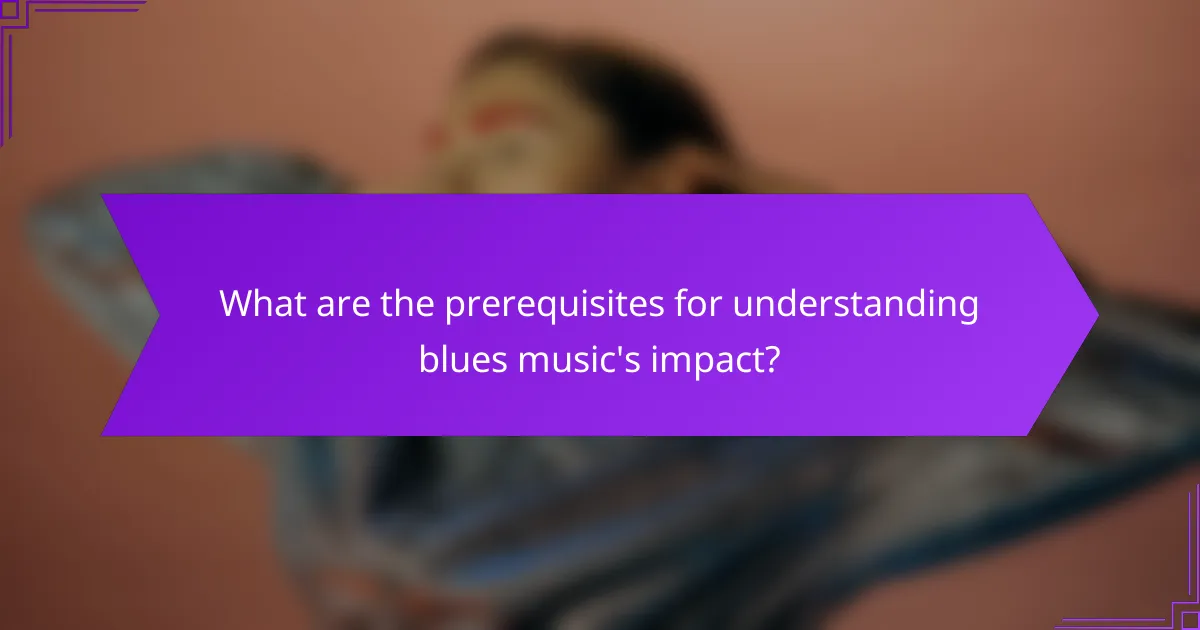
What are the prerequisites for understanding blues music’s impact?
To grasp the impact of blues music, one must understand its historical context, cultural roots, and social significance. Blues emerged from African American communities in the Deep South, reflecting their struggles and resilience.
Historical Context
The blues genre originated in the late 19th and early 20th centuries, primarily among African American populations in the southern United States. It was shaped by the experiences of slavery, segregation, and economic hardship, serving as a form of expression for marginalized voices.
Understanding the historical context of blues music involves recognizing its ties to African musical traditions, work songs, and spirituals. These influences contributed to the development of unique musical structures and lyrical themes that resonate with themes of suffering and hope.
Cultural Roots
Blues music is deeply rooted in African American culture, drawing from a rich tapestry of oral traditions, storytelling, and communal experiences. It often incorporates elements of jazz, gospel, and folk music, creating a distinctive sound that speaks to the collective identity of its creators.
The cultural roots of blues are evident in its instrumentation, typically featuring guitar, harmonica, and piano. These instruments not only provide the musical backdrop but also serve as tools for emotional expression, allowing artists to convey their personal and communal narratives.
Social Significance
Blues music plays a crucial role in social justice movements, acting as a powerful medium for protest and change. Many blues songs address issues such as racism, poverty, and inequality, making them relevant to contemporary social struggles.
Artists like B.B. King and Muddy Waters used their music to highlight injustices faced by African Americans, influencing later genres like rock and hip-hop. The social significance of blues extends beyond entertainment; it fosters awareness and encourages dialogue around critical societal issues.

